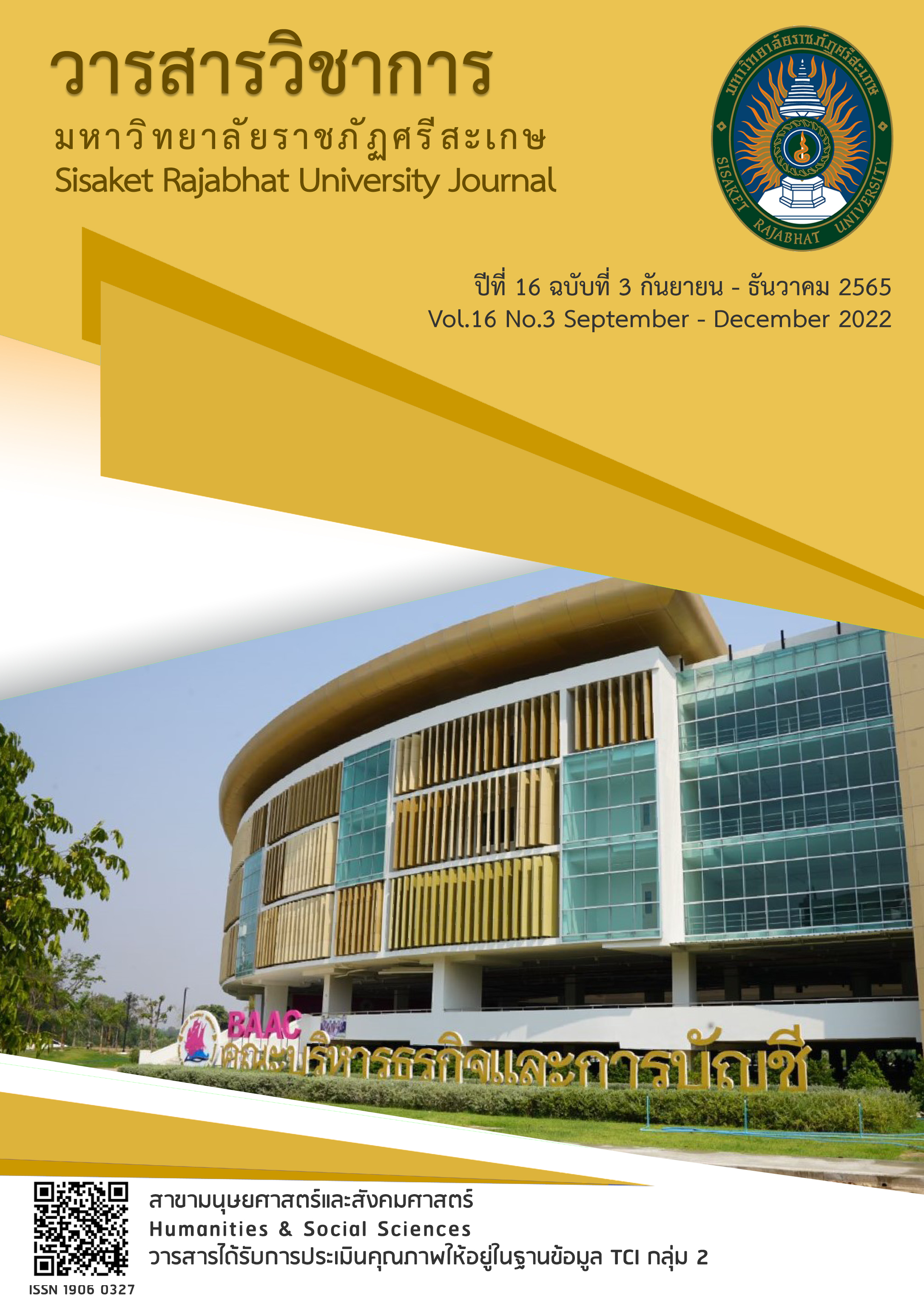การใช้เหตุผลเชิงจริยธรรม : กรณีศึกษานักศึกษาชั้นปีที่ 1 มหาวิทยาลัยสงขลานครินทร์ วิทยาเขตตรัง
Main Article Content
บทคัดย่อ
การวิจัยครั้งนี้มีวัตถุประสงค์เพื่อศึกษาระดับการใช้เหตุผลเชิงจริยธรรมของนักศึกษาชั้นปีที่ 1 และเปรียบเทียบการใช้เหตุผลเชิงจริยธรรมของนักศึกษาชั้นปีที่ 1 จำแนกตามปัจจัยด้านเพศ ด้านสาขาวิชาที่ศึกษา ด้านผลการเรียนเฉลี่ยสะสม ด้านการเข้าร่วมกิจกรรมทางศาสนาและวัฒนธรรม ด้านสถานภาพสมรสของผู้ปกครอง และด้านระดับการศึกษาของผู้ปกครอง แนวคิดการใช้เหตุผลเชิงจริยธรรมที่ใช้ในการศึกษาครั้งนี้ประยุกต์มาจากทฤษฎีพัฒนาการทางจริยธรรมของโคลเบิร์ก เก็บรวบรวมข้อมูลโดยใช้แบบสอบถามรูปแบบออนไลน์ จากประชากรนักศึกษาชั้นปีที่ 1 มหาวิทยาลัยสงขลานครินทร์ วิทยาเขตตรัง จำนวน 219 คน สถิติที่ใช้ในการวิเคราะห์ข้อมูล ได้แก่ ค่าความถี่ ร้อยละ ค่าเฉลี่ย ส่วนเบี่ยงเบนมาตรฐาน การทดสอบที และการทดสอบเอฟ
ผลการวิจัยพบว่า 1) ร้อยละ 58.90 ของนักศึกษาชั้นปีที่ 1 มีการใช้เหตุผลเชิงจริยธรรมอยู่ในระดับขั้นที่ 4 คือทำตามหน้าที่ทางสังคม และ 2) การใช้เหตุผลเชิงจริยธรรมของนักศึกษาชั้นปีที่ 1 แตกต่างกันตามปัจจัยด้านเพศอย่างมีนัยสำคัญทางสถิติที่ระดับ .05 และการใช้เหตุผลเชิงจริยธรรมของนักศึกษาชั้นปีที่ 1 ไม่แตกต่างกันตามปัจจัยด้านสาขาวิชาที่ศึกษา ด้านผลการเรียนเฉลี่ยสะสม ด้านการเข้าร่วมกิจกรรมทางศาสนาและวัฒนธรรม ด้านสถานภาพสมรสของผู้ปกครอง และด้านระดับการศึกษาของผู้ปกครอง
Article Details

อนุญาตภายใต้เงื่อนไข Creative Commons Attribution-NonCommercial-NoDerivatives 4.0 International License.
1. เนื้อหาและข้อมูลในบทความที่ลงตีพิมพ์ในวารสารวิชาการมหาวิทยาลัยราชภัฏศรีสะเกษ ถือเป็นข้อคิดเห็นและความรับผิดชอบของผู้เขียนบทความโดยตรง ซึ่งกองบรรณาธิการวารสาร ไม่จำเป็นต้องเห็นด้วย หรือร่วมรับผิดชอบใด ๆ
2. บทความ ข้อมูล เนื้อหา รูปภาพ ฯลฯ ที่ได้รับการตีพิมพ์ในวารสารวิชาการมหาวิทยาลัยราชภัฏศรีสะเกษ กองบรรณาธิการไม่สงวนสิทธิ์ในการคัดลอกบทความเพื่อการศึกษา แต่ให้อ้างอิงแหล่งที่มาให้ครบถ้วนสมบูรณ์
เอกสารอ้างอิง
โกศล มีคุณ. (2557). การวิจัยเพื่อสร้างเครื่องมือวัดเหตุผลเชิงจริยธรรมชนิดทั่วไปและชนิดเฉพาะกิจ และการประเมินความตรงจากการวัด. วารสารจิตพฤติกรรมศาสตร์: ระบบพฤติกรรม ไทย, 11(1), 16-65.
ดวงเดือน พันธุมนาวิน และเพ็ญแข ประจนปัจจนึก. (2520). จริยธรรมของเยาวชนไทย. (รายงานการ วิจัย). http://bsris.swu.ac.th/research_public.asp
น้ำทิพย์ ทับทิมทอง. (2554). การใช้เหตุผลเชิงจริยธรรมของนิสิตแพทย์มหาวิทยาลัยนเรศวร. วารสาร สมาคมจิตแพทย์แห่งประเทศไทย, 56(3), 287-296.
ปราณี ตันตยานุบุตร. (2550). การศึกษาความรู้ความเข้าใจและเหตุผลเชิงจริยธรรมของนักศึกษาระดับปริญญาตรี. วารสารสุทธิปริทัศน์, 21(65), 1-9.
พระชูชาติ คงสีดา. (2544). ความสัมพันธ์ระหว่างการอบรมเลี้ยงดู สัมพันธภาพในครอบครัว ความใกล้ชิดทางศาสนากับการใช้เหตุผลเชิงจริยธรรมของนักศึกษาผู้ใหญ่วิธีการเรียนทางไกลใน จังหวัดราชบุรี [วิทยานิพนธ์ปริญญามหาบัณฑิต ไม่ได้ตีพิมพ์] มหาวิทยาลัยศิลปากร. http://www.sure.su.ac.th/xmlui/handle/123456789/7992
พัชรินทร์ จิตต์มั่น. (2551). การศึกษาความฉลาดทางจริยธรรมและเจตคติต่ออาชีพอิสระของนักศึกษา คณะเทคโนโลยีคหกรรมศาสตร์ มหาวิทยาลัยเทคโนโลยีราชมงคลกรุงเทพ (พื้นที่พระนครใต้) [สารนิพนธ์ปริญญามหาบัณฑิต ไม่ได้ตีพิมพ์]. มหาวิทยาลัยศรีนครินทรวิโรฒ. http://thesis.swu.ac.th/swuthesis/Bus_Ed/Phatcharin_J.pdf
มหาวิทยาลัยสงขลานครินทร์ วิทยาเขตตรัง. (2564). สถิติทางการศึกษา. ระบบสารสนเทศสำหรับนักศึกษา. https://eds.trang.psu.ac.th/stat/
ศุภรา สรรพกิจ. (2551). ปัจจัยที่มีผลต่อการให้เห็นผลเชิงจริยธรรมของนักเรียนช่วงชั้นปีที่ 2 โรงเรียนวัดผาสุกมณีจักร อำเภอปากเกร็ด จังหวัดนนทบุรี [วิทยานิพนธ์ปริญญามหาบัณฑิต ไม่ได้ตีพิมพ์]. มหาวิทยาลัยศรีนครินทรวิโรฒ. http://thesis.swu.ac.th/swuthesis/Ed_Psy/Supara_S.pdf
ศูนย์คุณธรรม (องค์กรมหาชน). (2562). 10 ปรากฏการณ์ คุณธรรม จริยธรรมในสังคมไทย. http://1.179.131.172/namomweb/post/virtue(5).pdf
สำนักงานสถิติแห่งชาติ. (2564). สาขายุติธรรม ความมั่นคง การเมืองการปกครอง. สำนักงานสถิติ
แห่งชาติ. http://statbbi.nso.go.th/staticreport/page/sector/th/09.aspx
Al-Ansari, E. M. (2002). Effects of gender and education on the moral reasoning of Kuwait university students. Social Behavior and Personality, 30(1), 75-81. http://doi: 10.2224/sbp.2002.30.1.75.
Arutyunova, K. R., Alexandrove, Y. I., & Hauser, M. D. (2016). Sociocultural influence on moral judgments: East-West, male-female, and young-old. Frontiers in Psychology, 7: 1334. http://doi: 10.3389/fpsyg.2016.01334.
Baumsteiger, R., Chenneville, T., & McGuire, J. F. (2013). The roles of religiosity and spirituality in moral reasoning. Ethics & Behavior, 23(4), 266–277. http://doi: 10.1080/10508422.2013.782814
Bouhmama, D., & Al-Masoud, F.O. (2019). The impact of gender on the principled
moral reasoning of Kuwait education students. American International Journal of Social Science, 8(4), 6-14. http://doi:10.30845/aijss.v8n4p2
Collin, B. G. (2014). The effects of parental divorce on the moral judgment development of freshman and sophomore college students, Journal of Divorce & Remarriage, 55(2), 139-144. http://doi: 10.1080/10502556.2013.871954
Cooper, M., & Schwartz, R. (2007). Moral judgments and student discipline: What are institutions teaching? What are students learning? Journal of College Student Development, 48, 595-607. http://doi: 10.1353.csd.2007.0049.
Corcoran, R. P., & O’Flaherty, J. (2016). Examining the impact of prior academic achievement on moral reasoning development among college students: A growth curve analysis. Journal of Moral Education, 45(4), 433-448.
Dedih, U. (2018). Adolescent moral development in families. Jurnal Pendidikan Islam, 4(2), 63-76. http://doi: 10.15575/jpi.v4i2.2313.
Derryberry, W. P., Jones, K. L., Grieve, F. G., & Barger, B. (2007). Assessing the relationship among defining issues test scores and crystallised and fluid intellectual indices. Journal of Moral Education, 36, 475–796.
Ghorai, N.D., Khan, S., & Mohakud, L.L. (2021). Influence of family backgrounds on moral values in higher secondary students. East African Scholars J Edu Humanit Lit, 4(2), 41-47.
Glover, R.J. (1997). Relationships in moral reasoning and religion among members of conservative, moderate, and liberal religious groups. Journal of Social Psychology, 137(2), 247-254.
Hazra, S., & Mittal, S. (2018). Role of parenting in moral development: An overview. International Journal of Indian Psychology, 6(2), 144-151. http://doi: 10.25215/0602.057
Livingstone, G., Derryberry, W. P., King, A., & Vendetti, M. (2006). Moral development consistency? Investigating differences and relationships among academic majors. Ethics & Behavior, 16(3), 256-287.
Lyons, V.L. (2013). Moral reasoning of collegiate athletes and intramural sport athletes: an investigation of the influence of religiosity, gender, and type of sport played [Doctoral Dissertation]. The Ohio State University. (United State)
https://etd.ohiolink.edu/apexprod/rws_etd/send_file/send?accession=osu13 65427134&disposition=inline
Sanz-de-Galdeano, S., & Vuri, D. (2004). Does parental divorce affect adolescents' cognitive development? Evidence from longitudinal. Data. IZA DP No. 1206. Forschungsinstitut zur Zukunft der Arbeit Institute for the Study of Labor.
Septiari, D., Helmayunita, N., Serly, V., & Sari, V. F. (2020). Ethics in university: cognitive moral development and gender. Journal of Asian Finance, Economics, and Business, 7(12), 309–315. http://doi:10.13106/jafeb.2020.vol7.no12.309
Stapleton, M. (2013). An investigation of moral development: the effect of religiosity on Kohlbergian moral reasoning. Student Psychology Journal. IV(2013),1-14. https://psychology.tcd.ie/spj/past_issues/issue04/Stapleton,%202013.pdf
Thomas, J., & Dunphy, S. (2014). Factors affecting moral judgment in business students. Journal of the Indiana Academy of the Social Sciences, 17(1), 130-153. https://digitalcommons.butler.edu/jiass/vol17/iss1/10


